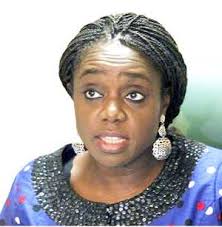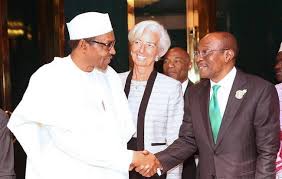A Development economist and a constructive critic of Intervention has faulted the platform’s story yesterday, (See “Is Debt Moratorium on the Table in the Turbulence of Negotiating Buhari’s Absence?”, May 16th, 2017) reporting the view in some quarters that only a debt moratorium could save the country from the perils of debt trap currently consuming 66% of earned revenue in debt servicing.

Kemi-Adeosun, Nigeria’s Finance Minister
While praising the storyline, saying it is nationalistic, the economist, however, faults Intervention and its sources for missing the point. The point, according to him, is that Nigeria’s foreign debt at the moment is so small that it is not an issue. Not only is Nigeria’s foreign debt stock today mostly concessional, long term and even interest free in some cases, with allowance for rolling over after some penalty for defaulting, the quantum is not a threat at all. Agreeing with the Debt Management Office, (DMO) that Nigeria’s Debt-GDP ratio is comfortable and that there is room for more borrowing if purposive, the critic says the problem and the danger is the domestic debt to banks, the payment of which he calls a time bomb for the country.
Explaining the position, the critical analyst said unlike foreign debts which can be renegotiated, domestic debts must be paid as and when due or the liquidity of the financial system would be threatened. So, domestic debt is a time bomb, consuming a lot of government revenue and leaving so little for spending on social services, the development of infrastructure or the transformation of agriculture which can employ labour. As such, debt always has implication for democracy because the private sector insists on commodifying social services and pricing such services as health, water, education and public transport out of the reach of the majority of the people. This alienates the popular masses, makes the government unpopular and weakens social cohesion among the people, thereby worsening ethnic and religious harmony. Instead of the government becoming popular, the financial sector becomes powerful and deterministic, tying the hands of policy makers and disallowing any room for innovations in managing social demands. Subsequently, the government becomes a mere conveyor belt through which the neoliberal policy direction is imposed.

Buhari, Lagarde and Emefiele on the eve of recession: Neoliberalism had finished him even before his ill-health compounded things
This will not change whether Buhari comes back or Osinbajo takes over, he argued, saying that only a powerful and popular political leader with a huge support base could hope to resist the neoliberal power players in Nigeria, an effort that he said has not succeeded in Venezuela where the people have been instigated against the government. As far as he is concerned, there has been nothing that neoliberal interests have not achieved even under Buhari who was arguing initially against liberalisation of the exchange rate. “Fuel subsidy has been removed, electricity tariff went up by 45 %, the currency has been devalued and the interest rate regime stays up. They have left Buhari with a diversionary anti-corruption war which is not touching the heart of the economy”, he said, adding how disinterested cross border finance is in the idea of solid minerals and agriculture beyond the rhetoric.
He concludes how difficult for anybody to predict how the time bomb might be diffused or how the clash between the people’s high expectations for jobs, education and health on the one hand and the profit calculations of cross border finance on the other will end. It will be worse in Nigeria because Nigerian politicians are too divided. Some sections of the politicians are so happy acting as local agents of metropolitan interests, they do not see any troubles ahead and they control the media as to be in a position to decide which policy to hail or to condemn, depending on their own interests.
Citing how so successfully neoliberal interests have commoditised private universities as for one of them to suggest recently that private universities should buy up the public universities, the economist maintained that he could not see any politician at the moment who would raise issues on how to resolve the time bomb in 2019.
According to this analyst, it is payment of domestic debts, joint venture commitments and oil financial involvements the IMF calculated to arrive at 66% as the amount Nigeria is committing to debt service, a condition considered dangerous because it leaves less than 40% of revenue available to government for spending on the people. By his analysis, the process works on the fact that governments hardly ever meet all its revenue targets. As such, it has to go back to the banks to borrow more. To do that requires not only paying higher interest because going back to borrow means a credit worthiness crisis, that also translates to higher interest rate regime since interest rate cannot fall below the rate at which government borrows and which is called the Benchmark interest rate. The implication is that, out of the current N7trillin plus budget, government might only be able to generate say N5trillion plus. Out of that, it is committing about N1.5trillion to debt servicing. That leaves it with just about N3trillion plus for everything it wants to do, which is not enough and it has to go aborrowing.
 To do so, it will be asked to privatise State Owned Enterprises, (SOEs) or devalue the currency as mechanisms for raising money. This, it is explained, is how neoliberalism comes in because it is not just local banks that are owed the debts but also transnational corporations and foreign banks which have subscribed to the bonds government sells. “If you default in payment as and when due, the credit rating agencies they control would rate the economy as having fallen to junk status which can spell more disaster”.
To do so, it will be asked to privatise State Owned Enterprises, (SOEs) or devalue the currency as mechanisms for raising money. This, it is explained, is how neoliberalism comes in because it is not just local banks that are owed the debts but also transnational corporations and foreign banks which have subscribed to the bonds government sells. “If you default in payment as and when due, the credit rating agencies they control would rate the economy as having fallen to junk status which can spell more disaster”.
This, he pointed out, brings in the cross-border dimension of domestic debts in terms of very powerful foreign players in the process who are in a position to make a typical African state a mere tool for managing ‘accumulation by dispossession’. By that expression, the economist meant the process of converting public wealth to private profit.
Cross-border financing has asserted itself everywhere, he stated, citing it as the most key force behind what Margret Thatcher had to do even in a more powerful economy such as Britain in the 1980s. “It was setting the tone for policy configuration and the boundaries of state regulation of the economy”, it is argued.
The Nigerian case is said to be compounded by the underdevelopment of the financial system compared to South Africa, for instance, where the pension fund and insurance companies are more developed. That leaves only the banks which, knowing how profitable government bonds are and how government can never go bankrupt, are keener in buying bonds and getting governments indebted to them as against loaning to agriculture or industries. Meanwhile, governments hardly use money realised from selling bonds in any transformative sense because it is mostly to bridge cash needs which could even be expended on items such as protocol or entertainment or even be corruptly stolen rather than used to build infrastructure or industries. So, domestic indebtedness becomes a vicious cycle.
Describing those who are thinking about debt moratorium as taking a lump view of Nigeria’s debt profile and, therefore, mistaken in thinking so, the critic chastised Intervention for wondering if Prof Osinbajo could rally round Nigeria’s external friends to push through a debt moratorium, saying that option does not even arise because domestic debt cannot be postponed in payment. As he argues, “to postpone payment will spell disaster for the economy and only a popular, strong government or leader can escape it”
While Intervention stands corrected on the nature of Nigeria’s debt, it has reservations about the inference that majority of the politicians are not opposed to neoliberalism. Given the defeat of proponents of IMF loan in 1986 and again in the Senate late last year in the move to privatise remaining national assets as a way of overcoming the recession, majority of the politicians could, in fact, be said to be statists at heart. While the neoliberals among them are smarter, dogged and more assertive, it is unlikely that the ‘statists’ would allow them. There can be nothing more instructive in this regard than the situation playing out right now in the government in which one set of the people in government are determined to concession all the airports at the same time that there are those determined to set up a state run national airline. In other words, nobody can predict which side would win this battle at the end of the day.




























